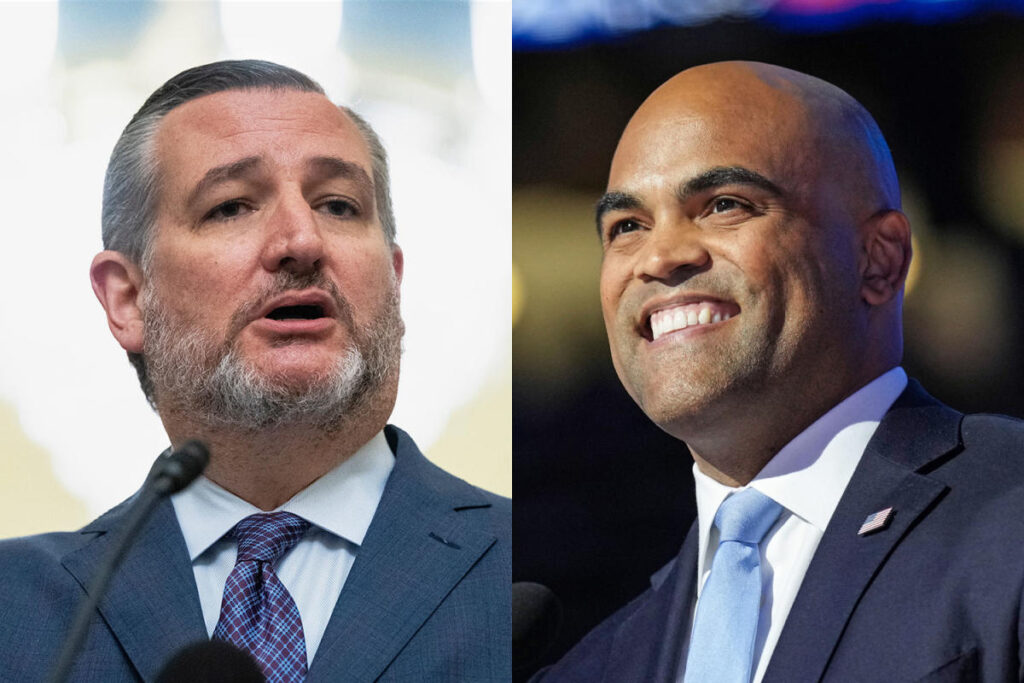During the recent Texas Senate race debate, Republican Senator Ted Cruz and Democratic Representative Colin Allred engaged in a spirited exchange, exchanging quippy remarks and sharply contrasting their policy positions. Cruz positioned himself as a steadfast conservative, claiming he would “fight to keep Texas Texas,” while Allred criticized Cruz for being ineffective during his twelve years in the Senate, labeling him a “do-nothing extremist.” Allred emphasized significant moments from Cruz’s past, notably highlighting his controversial trip to Cancún during the 2021 winter storm that left many Texans without power. He also pointed to Cruz’s evasive actions during the January 6 Capitol riots as further evidence of his failure to lead effectively. “We don’t have to have a senator like this,” Allred insisted, firmly establishing a point of contention.
Cruz, in response to Allred’s attacks, maintained a confident demeanor, remarking on Allred’s adroit use of prepared lines and arguing that there is a substantial gulf between Allred’s words and his voting record. He touted his legislative achievements while downplaying the weight of Allred’s criticisms. Polling indicates the race is closely contested despite Texas’s reputation as a Republican stronghold, with Cruz holding a narrow lead of 4 to 5 points in various surveys. This suggests that while Cruz has the advantage, Allred’s campaign has resonated with voters, creating an environment where surprises may be possible.
As the debate progressed, Cruz sought to bolster his stance on energy and inflation, laying blame on the Democrats for rising costs. He expressed significant concern over the issue of transgender athletes participating in women’s sports, challenging Allred to defend his views on this contentious topic. Cruz’s comments suggested that he believes in protecting women’s sports and that allowing transgender women to compete undermines fairness, a viewpoint that Allred contested. Allred responded affirmatively, stating he does not support boys competing in girls’ sports but critiqued Cruz for leveraging the discourse on gender equality to distract from other pressing issues such as reproductive rights.
Allred’s opening remarks established his self-identified role as a bipartisan figure in Congress, setting the stage as a contrast to Cruz, whom he branded as the most extreme senator focused solely on self-interest. He accused Cruz of attempting to reshape his public persona from an extreme radical to a moderate for the upcoming election, while Allred positioned himself as a candidate dedicated to health care and abortion issues. Allred reaffirmed his commitment to supporting any legislative measures that would restore the protections granted under Roe v. Wade, underscoring his support for bodily autonomy.
Throughout the debate, Cruz avoided giving direct answers regarding the contentious topic of abortion, particularly on whether he supported exceptions for rape or incest. Instead, he reiterated his view that decisions regarding abortion should ultimately be made at the state legislative level, portraying himself as an advocate for states’ rights. He framed the Democrats’ stance on abortion as excessively extreme and radical. The exchange illustrated a profound divide between the candidates regarding women’s reproductive rights, a key issue for many voters in Texas.
The debate also touched upon the aftermath of the January 6 Capitol riots, with Allred holding Cruz accountable for his actions leading up to and following that day. When asked whether he would support pardoning the rioters, Cruz avoided a definitive answer, emphasizing a focus on prosecuting criminal acts. He interspersed his comments with references to various protests across the country, suggesting a comparative perspective of violence that sought to deflect attention from his own previous objections to the certification of the 2020 election results. Allred boldly asserted that Cruz posed a threat to democracy, a statement that encapsulated the gravity of their ideological rift. This debate underscored the stakes for both candidates, as Texas remains a battleground state that could significantly influence the balance of power in the Senate.

